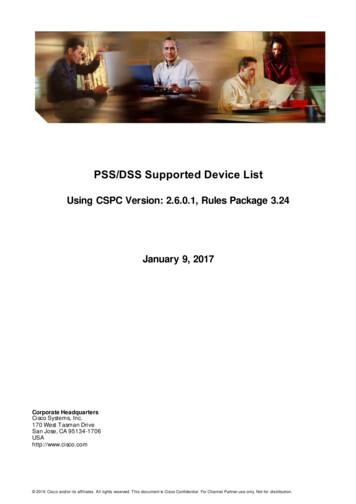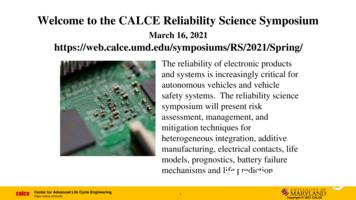EE 4000: Power System Reliability
LSUEE 4000: Power System ReliabilityLecture 1Amin KargarianElectrical & Computer Engineering Department1
LSUContact Information Instructor: Amin KargarianOffice: PFT 3316LOffice hours: TBDEmail: kargarian@lsu.eduPhone: (225) 578-3091Teaching Assistant: TBDTA Office hours: TBDRecitation: TBDElectrical & Computer Engineering Department2
LSUIntroduce Yourself NameDepartmentProgramWhy are you interested in this course?Electrical & Computer Engineering Department3
LSUToday‘s Lecture Course Overview––––––Lecture contentExamsGradingImportant datesRules and policiesOther required informationElectrical & Computer Engineering Department4
LSUCourse Overview Lecture: Monday & Wednesday & Friday, 9:30am –10:20am, Tureaud Hall 228 Lecture Material: Slides and textbook– Lectures will be based on notes and handouts provided bythe instructor. Therefore, attendance at lectures and yourattention is very important.Electrical & Computer Engineering Department5
LSUCourse Overview Textbook:– Roy Billinton, and Ronald Allan, “Reliability Evaluation ofEngineering Systems” Springer. (this is the main textbook for thiscourse)– Roy Billinton, and Ronald Allan, “Reliability Evaluation of PowerSystems” Springer.– Ali Chowdhury, and Dan Koval, “Power Distribution SystemReliability” Wiley & Sons, 2009.Electrical & Computer Engineering Department6
LSUPre-Requisites Any course related to Statistics or Probability AnalysisElectrical & Computer Engineering Department7
LSULecture ContentOverall subject: Basic principles of reliability evaluation ofengineering systems with main focus on power systems Introduction to reliabilityBasic probability theoryApplication of the binomial distributionNetwork modelling and evaluation of simple systemsNetwork modelling and evaluation of complex systemsProbability distributions in reliability evaluationSystem reliability evaluation using probability distributionsDistribution systems reliability—basic techniques and radialnetworks Plant and station availabilityElectrical & Computer Engineering Department8
LSULecture ContentElectrical & Computer Engineering Department9
LSUCourse Calendar Starting date: January 11, 2017 Ending date: April 28, 2017 Midterm exam: Monday, March 6, 2016Electrical & Computer Engineering Department10
LSUCourse CalendarSessionTopic2-3Introduction to reliability4-6Basic probability theory7-9Application of the binomial distribution10-13Network modelling and evaluation of simple systems14-19Network modelling and evaluation of complex systems20-22Probability distributions in reliability evaluation23-26System reliability evaluation using probabilitydistributions27-34Distribution systems reliability—basic techniques andradial networks34-36Plant and station availabilityElectrical & Computer Engineering Department11
LSUTests and Grading CriteriaUndergraduateGraduateHomework (25%)Homework (25%)Quizzes (10%)Up to 6 quizzes over the semesterQuizzes (10%)Up to 6 quizzes over the semesterClassroom Participation (5%)Classroom Participation (5%)Midterm Exam (20%) & Final Exam (30%):- Similar to homework questions- Midterm during the semester, final exam(cumulative) in final exam weekMidterm Exam (20%) & Final Exam (20%):- Similar to homework questions- Midterm during the semester, final exam(cumulative) in final exam weekProject (10%):- Simulation with a software- Research projectProject (20%):- Simulation with a software or- Research projectElectrical & Computer Engineering Department12
LSUTests and Grading Criteria 97 p 10093 p 9790 p 9387 p 9083 p 8780 p 8377 p 8073 p 7770 p 7367 p 7063 p 6760 p 63p 60 Grades may be affected by curving at the instructor's discretion.grade A grade Agrade Agrade B grade Bgrade Bgrade C grade Cgrade Cgrade D grade Dgrade Dgrade FElectrical & Computer Engineering Department13
LSUClass Attendance and Bonus Class Attendance: Your attendance grade will be calculated using thefollowing formulaN 3 Number of Unexcused absences 100Nwhere N represents the number of class meetings in the semester.Attendance Grade The attendance grade has a minimum of 0% and a maximum of 100%. Bonus: if you participate in classroom activities, you will receive bonuspoints which will be added to the final grades.Electrical & Computer Engineering Department14
LSUCourse Objectives and Outcomes The course will provide students with a fundamental knowledge on thereliability evaluation of engineering systems with emphasis on electricpower systems. Models and methodologies for power systems reliabilityassessment will be studied. Application of probability theory for design andmanagement of power generation, transmission and distribution systemswill be presented. Upon completion of this course, students should be able to– Assess the reliability of engineering systems– Apply concepts of the probability theory for power systems reliabilityevaluation– Do basic studies of power generation and transmission reliability– Analyze reliability of distribution electricity networks– Design (and expand) a system (which fulfill a specific task, e.g., a radial powerdistribution network) with respect to desired reliability indicesElectrical & Computer Engineering Department15
LSUDeadlines Each assignment/project milestone has a clear deadline.However,– each student gets two jokers which can be used to extend a deadline bytwo days– if at the end of the semester a student still has one of the jokers, he/shegets 2 additional percent per joker for the grade of the final exam– once the jokers are gone, if assignments are turned in late, 50% will bededucted from the assignment grade– assignments handed later than one week of the deadline are graded with0 points– if there is a special situation which makes it difficult for you to hand inyour work on time even with jokers, please come and talk to meElectrical & Computer Engineering Department16
LSUHow to turn in homework In class on due date As an email attachment to kargarian@lsu.edu (put EE7400 insubject line) Sliding under the door of my office (ERAD 333)Electrical & Computer Engineering Department17
LSUPolicies Plagiarism: Students are responsible for completing and submitting theirown course work and preparing their own modules. All work submitted inthe course modules must be the student’s own work unless outside work isappropriate to the assignment; all outside material must be properlyacknowledged. It is also unacceptable to copy directly from your textbookor to use published answer keys or the teacher's edition of a textbook. Collaboration: Unauthorized collaboration constitutes plagiarism.Collaborative efforts that extend beyond the limits approved by theinstructor are violations of the academic integrity policy. Students whostudy together are expected to prepare and write their own individual workfor submission and grading.Electrical & Computer Engineering Department18
LSUPolicies Disabilities : Louisiana State University is committed to providing reasonableaccommodations for all persons with disabilities. The syllabus is available inalternate formats upon request.If you have a disability that may have some impact on your work in this class andfor which you may require accommodations, please see a staff member inDisability Services so that such accommodations can be considered. Students thatreceive accommodation letters, please meet with me to discuss the provisions ofthose accommodations as soon as possible. Expectations: LSU’s general policy states that for each credit hour, you (thestudent) should plan to spend at least two hours working on course related activitiesoutside of class. Since this course is for three credit hours, you should expect tospend a minimum of six hours outside of class each week working on assignmentsfor this course. For more information see:http://catalog.lsu.edu/content.php?catoid 12&navoid 822Electrical & Computer Engineering Department19
Jan 11, 2017 · – Assess the reliability of engineering systems – Apply concepts of the probability theory for power systems reliability evaluation – Do basic studies of power generation and transmission reliability – Analyze reliability of distribution electricity networks – Design (and expand) a
4000 Series Cards NP-1A-SM-LR 4000 Series Cards NP-1E 4000 Series Cards NP-1F-D-MM 4000 Series Cards NP-1F-D-SS 4000 Series Cards NP-1F-S-M 4000 Series Cards NP-1FE 4000 Series Cards NP-1HSSI 4000 Series Cards NP-1RV2 4000 Series Cards NP-2E 4000 Series Cards NP
Ricoh Aficio MP 4000/5000 series Refer to Table 1 about product names for "Ricoh imagio MP 4000/5000 series" and "Ricoh Aficio MP 4000/5000 series". TOE Version : "Ricoh imagio MP 4000/5000 series" and "Ricoh Aficio MP 4000/5000 series" are identified by following software and hardware. Software System/Copy 1.09 Network Support 7.23
BTL-4000 Professional 10 Main features 11 Electrotherapy 12 BtL-5000 Series 14 BtL-4000 Smart & Premium 16 BtL-4000 Professional 18 Ultrasound 22 BtL-5000 Series 24 BtL-4000 Smart & Premium 26 HandsFree Sono 28 BtL-4000 Professional 30 Clinical background 31 Laser therapy 32 BtL-5000 Series 34 BtL-4000 Smart & Premium 36 BtL-4000 Professional 38
Test-Retest Reliability Alternate Form Reliability Criterion-Referenced Reliability Inter-rater reliability 4. Reliability of Composite Scores Reliability of Sum of Scores Reliability of Difference Scores Reliability
BTL-4000 Ultrasound therapy (Topline Professional) 42 BTL-4000 Laser therapy (Topline Professional) 44 BTL-4000 Magnetotherapy (Topline Professional) 46 BTL-4000 Combination therapy (Topline Professional) 48 BTL-4000 Combi units 49 Overview of the BTL-4000 models 51 BTL-6000 Lymphastim (Presso-therapy) 52 BTL-20 Shortwave therapy 56 BTL .
4000 Series 4000 Series Power Transfer Switches Product Features Fig. 1:Three Pole 4000 Series Automatic Transfer Switch rated 800 amperes (shown with optional front connected terminals and Power Manager). ASCO 4000 SERIES *Only two contacts standard on 150-400A 4ACTS and 4NCTS
Reliability Infrastructure: Supply Chain Mgmt. and Assessment Design for reliability: Virtual Qualification Software Design Tools Test & Qualification for reliability: Accelerated Stress Tests Quality Assurance System level Reliability Forecasting: FMEA/FMECA Reliability aggregation Manufacturing for reliability: Process design Process variability
additif alimentaire, exprimée sur la base du poids corporel, qui peut être ingérée chaque jour pendant toute une vie sans risque appréciable pour la santé.5 c) L’expression dose journalière admissible « non spécifiée » (NS)6 est utilisée dans le cas d’une substance alimentaire de très faible toxicité lorsque, au vu des données disponibles (chimiques, biochimiques .























